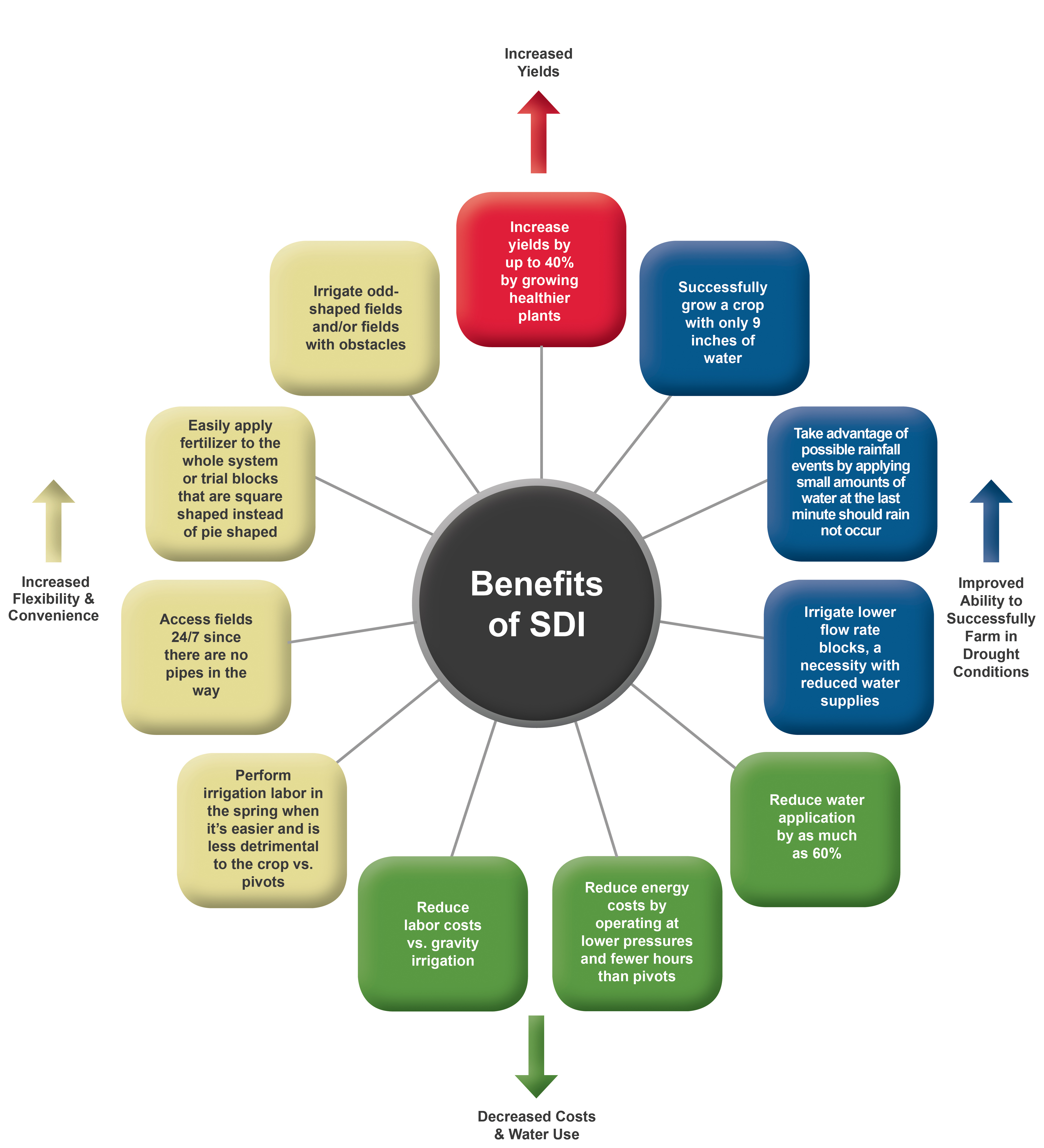Imagine watering your plants without lifting a finger. Sounds like a dream, right?
Well, with subsurface irrigation systems, this dream is now a reality. You might be wondering how this system works and why it’s becoming a favorite among gardeners and farmers. The secret lies beneath the surface, where water is delivered directly to the roots of your plants, ensuring they get exactly what they need to thrive.
No more wasted water and no more dried-up plants. This efficient method not only saves you time but also helps conserve precious resources. But that’s not all—subsurface irrigation systems offer a myriad of benefits that could transform your gardening or farming experience. Curious to know more? Let’s dive in and discover how this innovative system can revolutionize the way you nurture your plants.

Increased Water Efficiency
Subsurface irrigation systems offer a smart solution for water conservation. These systems apply water directly to plant roots, reducing waste. They ensure that every drop of water serves its purpose efficiently. This technology is transforming how we approach irrigation, especially in regions with scarce water resources. Understanding its benefits can lead to more sustainable farming practices.
Improved Water Delivery
Subsurface irrigation systems deliver water directly to plant roots. This method cuts down on evaporation losses, ensuring more water reaches plants. It eliminates surface runoff and decreases water wastage significantly. Farmers can grow crops using less water, conserving this precious resource.
Reduced Evaporation
With subsurface systems, water is applied beneath the soil surface. This placement minimizes exposure to the sun, preventing evaporation. Water remains in the soil longer, nourishing plants effectively. This technique saves both water and energy, benefiting the environment.
Consistent Moisture Levels
Subsurface irrigation maintains consistent soil moisture levels. Plants receive a steady supply of water directly to their roots. This consistent moisture supports healthy growth and increases crop yields. It also reduces the risk of plant stress during dry periods.
Lower Water Consumption
These systems require less water to irrigate fields. By targeting the root zone, water usage drops dramatically. This efficiency leads to lower water bills for farmers. It also supports sustainable farming practices in arid regions.
Enhanced Soil Health
Subsurface irrigation promotes soil health by preventing erosion. Water is applied under the surface, reducing soil movement. This technique maintains soil structure and fertility. It helps farmers produce healthier crops with better yields.

Enhanced Root Development
Subsurface irrigation systems bring numerous advantages to agricultural practices. Among these, enhanced root development stands out. This method supplies water directly to the root zone. It facilitates optimal growth conditions for plant roots. Healthy roots are essential for robust plant growth. They improve nutrient absorption and increase crop yield.
Improved Water Distribution
Subsurface irrigation ensures even water distribution. Water reaches deep into the soil. This supports root growth in a uniform manner. Roots grow deeper and stronger. This leads to better plant stability and health.
Reduced Water Stress
Plants suffer less from water stress. Subsurface irrigation minimizes evaporation. It maintains consistent moisture levels in the soil. Roots receive steady water supply. This aids in healthy root expansion.
Enhanced Nutrient Uptake
Nutrients in the soil are better absorbed. Water delivered close to roots boosts nutrient absorption. Roots become more efficient in taking up nutrients. This results in healthier plants and improved growth.
Deeper Root Systems
Roots grow deeper due to consistent moisture. Deep roots access more soil nutrients. They provide better anchorage to plants. Strong root systems support tall and robust plants. This is crucial for wind resistance and overall plant vigor.
Reduced Soil Erosion
Subsurface irrigation decreases soil erosion. Strong roots hold the soil together. This prevents soil wash away during heavy rains. It maintains soil structure and fertility. This is vital for sustainable farming.
Reduced Weed Growth
Subsurface irrigation systems offer many benefits, including reduced weed growth. This technique delivers water directly to plant roots. It minimizes surface moisture, which is a key factor in weed proliferation. This approach is particularly effective for farmers and gardeners looking to maintain healthier crops without excessive weed interference.
Why Reduced Surface Moisture Matters
Weeds thrive in moist conditions. Surface water encourages their growth. Subsurface irrigation limits moisture on the soil surface. This makes the environment less inviting for weed seeds. With less moisture, weeds struggle to germinate and spread.
Targeted Water Delivery
This irrigation method ensures water reaches plant roots directly. It avoids unnecessary watering of the soil surface. By focusing on root zones, plants receive adequate hydration. Meanwhile, weeds lack the water they need to flourish. This targeted approach benefits crop health and reduces weed competition.
Less Soil Disturbance
Subsurface irrigation doesn’t disturb the soil surface. Traditional watering methods can loosen soil, exposing weed seeds. By keeping the surface undisturbed, weeds remain buried and inactive. This preserves soil integrity and reduces weed emergence.
Efficient Water Use
Subsurface irrigation uses water efficiently. It reduces runoff and evaporation. Less water on the surface means fewer weeds. This system ensures plants get the water they need. It also saves water, reducing waste and helping the environment.

Improved Nutrient Uptake
Subsurface irrigation systems offer a cutting-edge solution for enhancing crop growth and productivity. One of the standout benefits of these systems is their ability to improve nutrient uptake. With water delivered directly to the root zone, plants have better access to nutrients, leading to healthier and more robust growth. But how does this work in practice, and why should you care?
Enhanced Root Zone Nutrient Availability
Subsurface irrigation ensures that water reaches the roots directly, minimizing evaporation and surface runoff. This targeted delivery keeps nutrients in the soil, right where your plants need them. Imagine your plants thriving because they receive a consistent supply of essential nutrients. This system supports balanced plant nutrition, which leads to stronger, more productive crops.
Reduction In Nutrient Loss
When irrigation water is applied on the surface, nutrients can easily wash away with runoff or evaporate. Subsurface irrigation reduces this risk significantly. You maintain more nutrients in the soil, preventing wastage. This method not only conserves resources but also helps in protecting the environment by reducing nutrient leaching into nearby water bodies.
Uniform Nutrient Distribution
Traditional irrigation methods can lead to uneven distribution of water and nutrients. Subsurface systems promote uniform distribution, ensuring every plant gets an equal share of nutrients. This uniformity can lead to more predictable yields. Picture your garden or farm with consistent plant growth because each plant has access to the same quality of resources.
Efficient Use Of Fertilizers
With improved nutrient uptake, subsurface irrigation allows for more efficient use of fertilizers. You can apply fertilizers directly to the root zone, reducing the quantity needed while maximizing effectiveness. This efficiency not only cuts costs but also enhances crop quality. Are you considering ways to cut down on agricultural expenses without compromising yield?
By optimizing nutrient uptake, subsurface irrigation systems can transform the way you cultivate your crops. The benefits are tangible—healthier plants, reduced nutrient loss, and cost-effective farming practices. What could be better than knowing your plants are thriving with minimal environmental impact?
Conclusion
Subsurface irrigation systems offer many practical benefits. They save water efficiently. Plants get water directly at their roots. This reduces waste and boosts growth. Maintenance is easy with these systems. They work well in different soil types. Farmers and gardeners find them helpful.
They support healthy crops without much effort. Investing in subsurface irrigation can enhance productivity. It’s a smart choice for sustainable farming. Consider this system for better yields. It brings reliable results for your plants. Embrace this technology for effective irrigation.
Make the most of your resources wisely. It’s a beneficial solution for many.



